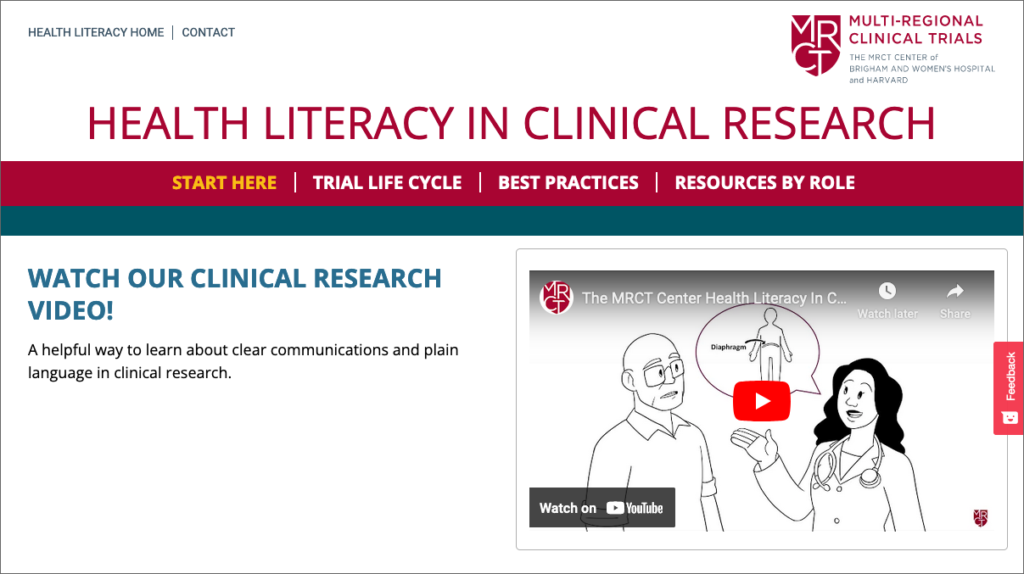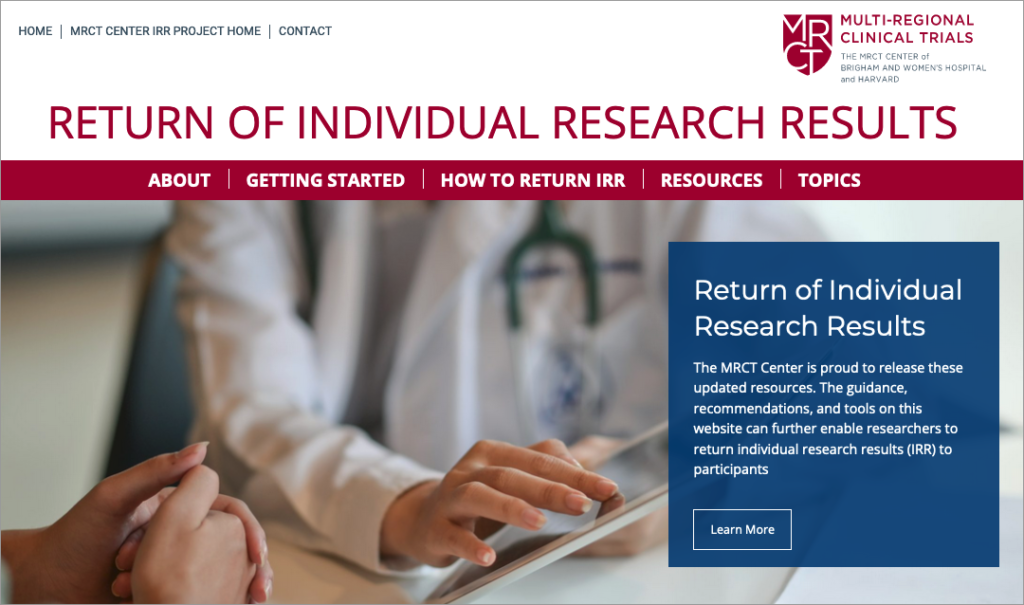Representation in Research

The participant populations enrolled in clinical trials should reflect the populations of those affected by the disease or condition for which the intervention is being tested. Representation in research is basic, good science. Everyone should be able to “see themselves” in clinical trials and research data and to know whether approved vaccines, therapies, devices, and medications (including medication doses) are right for them Without appropriate representation of the people who will use the tested products, we don’t know how safe or effective those products are for different people (e.g., people with varying ages, sexes, genders, body types, genetic backgrounds, co-existing health conditions, income levels, environmental exposures, and/or life stages).
Despite efforts, there is still a great deal to learn as we work toward greater access to clinical trials and improved health outcomes. The barriers that potential participants face in finding and accessing clinical trials differ, as do the approaches that might mitigate these challenges. For some people, reducing the burden of participation through the introduction of decentralized elements is helpful; for others, it is translation, communication (e.g., plain language, visualization), reimbursement, community, and caregiver involvement, among others. And, while the MRCT Center released guidance and tools to address representation in research early in the COVID pandemic, we continue to learn more about the specific ways that people from different populations can best be supported to participate in clinical research.
Our work continues, and we remain committed to it. We are continually expanding our portfolio of tools and resources. Our aim is for everyone to have a “fair shot,” both in terms of the opportunity to participate in clinical trials and in terms of being able to trust the results of that research, conducted through rigorous and ethical research practices.









Objectives
- Describe the obstacles potential participants are facing in accessing U.S. and multi-regional clinical trials, including scientific, ethical, and geographical challenges; and generate and share lessons learned about potential approaches for effective communication, recruitment, and retention of participants from a variety of backgrounds.
- Support engagements and sustainable partnerships with community champions, organizations, and referring providers, and workforce development of clinical research personnel. Develop and disseminate actionable and scalable solutions (“tools”) to support representation in research, greater access to clinical trials, and improved health outcomes.
Key Milestones
- November 2025: LGBTQIA+ Inclusion by Design Toolkit
- March 2025: Launch of two additional tools in Global Representation: Embedding Ethical Considerations Relating to Global Representation and Working with Partner Countries to Strengthen Research Capacity Building Relating to Global Representation.
- October 2024: Accessibility 101 Training Series
- September 2024: Launch of two tools in Global Representation: Global Representation Roadmap and Model DAP.
- May 2024: Toward a National Action Plan for Achieving Diversity in Clinical Trials released.
- May 2023: Released the Accessibility by Design (AbD) Toolkit at a webinar.
- June 2022: Held webinar to launch the Equity by Design Metrics Framework and User Guide.
- June 2022: Launched IRB and HRPP Toolkit.
- March-April 2022: Conducted a virtual six-part training on “Equity by Design in Clinical Research: Cancer Trials” for over 450 clinical research practitioners (live course, for CME credit; now available as an online course, not for CME credit).
- April 2021 – July 2021: Leaning In webinar series “Driving Inclusion in Clinical Research” emphasizes how to plan for inclusion, implement recommendations, and sustain progress.
- August 2020: MRCT Center releases Achieving Diversity, Inclusion, and Equity in Clinical Research Guidance Document.
Project Leadership & Staff
- Willyanne DeCormier Plosky, Program Director, MRCT Center
- Hayat Ahmed, Program Manager, MRCT Center
- Barbara Bierer, Faculty Director, MRCT Center
Project Resources
-
Annual Report
January 30, 2026
2025 MRCT Center Year in Review ›
-
Webinar
-
Public Comments
September 18, 2025
E21 Inclusion of Pregnant and Lactating Women in Clinical Trials ›
-
Publication
August 6, 2025
Disparate data retention standards in biomedical research ›
-
Case Study
-
Tools
May 30, 2025
LGBTQIA+ Inclusion – Inclusive Imagery ›
-
Tools
May 30, 2025
LGBTQIA+ Inclusion – Inclusive Language Checklist ›
-
Tools
-
Tools
-
Tools
-
Tools
May 30, 2025
Exit Survey Inclusive of the LGBTQIA+ Perspective ›
-
Tools
-
Podcast
-
Publication
-
Podcast
-
Publication
-
Publication
-
Publication
-
Publication
-
Guidance
-
Guidance
-
Public Comments
-
Webinar
-
Publication
-
Podcast
November 25, 2024
Podcast Episode 2: Trials Beyond Borders ›
-
Tools
November 18, 2024
Participant Questionnaire from the LGBTQIA+ Perspective ›
-
Publication
-
Webinar
October 23, 2024
Health Literacy Month Webinar Series ›
-
Webinar
-
Training
October 20, 2024
Accessibility 101 Training Series ›
-
Public Comments
-
Public Comments
-
Tools
September 4, 2024
Global Representation Roadmap ›
-
Tools
September 4, 2024
Model Diversity Action Plan (DAP) ›
-
Podcast
August 28, 2024
Podcast Episode 1: Trials Beyond Borders ›
-
Publication
-
Public Comments
-
Public Comments
-
Webinar
-
Public Comments
-
Public Comments
-
Public Comments
-
Webinar
-
Publication
-
Publication
-
Framework
-
Public Comments
-
Public Comments
-
Webinar
March 7, 2024
REACH: Advancing DEI in Human Participant Research ›
-
Public Comments
-
Public Comments
-
Public Comments
November 10, 2023
Comment on the American Community Survey SOGI Test ›
-
Public Comments
September 30, 2023
Comments and Suggestions on Updating the NIH Mission Statement ›
-
Publication
-
Publication
-
Publication
-
Publication
-
Flyer
-
Publication
-
Webinar
May 4, 2023
Accessibility by Design (AbD) Toolkit Release ›
-
Tools
May 4, 2023
Accessibility by Design (AbD) Toolkit ›
-
Publication
-
Annual Report
December 15, 2022
2022 MRCT Center Annual Report ›
-
Proceedings
December 14, 2022
MRCT Center 2022 Annual Meeting Proceedings ›
-
MRCT Sponsor Resource
-
Presentation
December 14, 2022
MRCT Center 2022 Annual Meeting Slides ›
-
Publication
December 7, 2022
Protecting the Vulnerable and Including the Under-Represented ›
-
Publication
-
Publication
-
Public Comments
-
Tools
-
Publication
September 28, 2022
Externalist, Process-Based Approach to Supported Decision-Making ›
-
Webinar
-
Presentation
July 14, 2022
Equitable Practices for Children’s Vision Research ›
-
Publication
-
Video
-
Webinar
-
Webinar
-
Webinar
-
Presentation
-
Presentation
-
Framework
-
Tools
-
Tools
-
Publication
-
Tools
-
Tools
-
Tools
-
Tools
-
Tools
-
Tools
-
Tools
-
Tools
-
Tools
-
Tools
-
Public Comments
-
Training
-
Publication
-
Publication
-
Publication
-
Publication
-
Publication
January 1, 2022
Promoting Equity By Design In Cancer Trials ›
-
Annual Report
December 7, 2021
2021 MRCT Center Impact Report ›
-
Publication
-
Publication
-
Publication
-
Webinar
-
Webinar
-
Webinar
-
Webinar
-
Presentation
-
Webinar
-
Webinar
-
Webinar
January 13, 2021
MRCT Center Leaning In webinar: Data Standards and Analysis ›
-
Annual Report
December 20, 2020
2020 MRCT Center Impact Report ›
-
Webinar
-
Proceedings
December 3, 2020
MRCT Center 2020 Annual Meeting Proceedings ›
-
Presentation
December 3, 2020
MRCT Center 2020 Annual Meeting Slides Part 1 ›
-
Presentation
December 3, 2020
MRCT Center 2020 Annual Meeting Slides Part 2 ›
-
Webinar
-
Publication
-
Webinar
-
Webinar
November 10, 2020
PRIM&R WEBINAR: “THE IRB’S ROLE IN ACHIEVING DIVERSITY IN RESEARCH” ›
-
Presentation
-
Webinar
October 28, 2020
MRCT Center Leaning In webinar: Workforce Development ›
-
Presentation
-
Webinar
-
Webinar
-
Webinar
October 14, 2020
MRCT Center Leaning In Webinar Series ›
-
Publication
September 29, 2020
Emerging work on Diversity & Clinical Trials: A Spotlight on the MRCT ›
-
Presentation
September 23, 2020
The Way Forward: From ‘diagnosis’ to ‘treatment’ of COVID-19 ›
-
Presentation
September 22, 2020
Achieving Diversity, Inclusion, and Equity In Clinical Research ›
-
Publication
-
Podcast
-
Podcast
-
Podcast
-
Principles
-
Tools
-
Framework
-
Framework
-
Framework
August 1, 2020
Defining Diversity ›
-
Tools
-
Tools
-
Tools
-
Tools
-
Tools
-
Case Study
-
Case Study
-
Case Study
-
Case Study
-
Case Study
-
Case Study
-
Case Study
-
Case Study
-
Case Study
-
Case Study
-
Case Study
-
Tools
-
Guidance
-
Tools
-
Public Comments
-
Presentation
-
Tools
-
Publication
-
Annual Report
December 4, 2019
2019 MRCT Center Impact Report ›
-
Principles
-
Presentation
October 29, 2019
Evolving science in clinical trials in special populations ›
-
Tools
-
Tools
-
Presentation
October 8, 2019
Efficiencies in Clinical Research: A USA perspective ›
-
Presentation
-
Presentation
October 3, 2019
A USA perspective on diversity and inclusion ›
-
Tools
-
Public Comments
-
Public Comments
-
Other
-
Annual Report
December 5, 2018
2018 MRCT Center Impact Report ›
-
Presentation
November 15, 2018
Does Diversity Matter in the Conduct of a Clinical Trial? ›
-
Project-Specific Website






